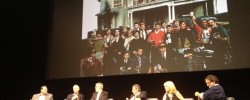
DVD Review: La Promesse (1996)
Cast: Jérémie Renier, Olivier Gourmet, Assita Ouedraogo
Director: Jean-Pierre Dardenne, Luc Dardenne
Country: Belgium | France | Luxembourg
Genre: Drama
Official Trailer: Here
Editor’s Notes: La Promesse was released on DVD and Blu Ray by The Criterion Collection on August 14th.
La promesse, directed by Luc and Jean-Pierre Dardenne, presents the screen debut of Jérémie Renier at fourteen years of age, playing a son whose unemployed father is involved in the trafficking of illegal immigrants. While not their first feature film, the Dardenne brothers consider La promesse their official debut feature, insofar as it follows the disillusioning experience of their second fiction feature Je pense à vous (1992); and embodies on several levels the brothers’ documentary impulse and beginnings and mode of independent filmmaking that they had lost during the production of Je pense à vous. The title La promesse thus refers not only to the narrative but also to the Dardennes’ henceforth stubborn commitment to their distinct mode of filmmaking and economical, visceral cinema of often young outcasts bent on survival; of ethical encounters; and often set against the post/industrial landscape of Seraing, Belgium.
…embodies on several levels the brothers’ documentary impulse and beginnings and mode of independent filmmaking that they had lost during the production of Je pense à vous.
The opening sequences constitute a model of economic narrative and visuals whose force echoes throughout the film: Igor (Renier) is an apprentice auto mechanic but must leave the body shop when his father Roger (Olivier Gourmet) arrives. The father and son drive down a highway, followed by a truck carrying cars. When their car and the truck stop, people emerge from the cars carried by the truck. This unexpected sight immediately betrays Igor’s life as a primary accomplice to his father’s business of trafficking illegal immigrants, putting them to work, housing them in makeshift conditions, and ripping them off in exchange for the basic amenities at a physical level (heat) and socio-legal level (papers). Igor is not only witness to these conditions but also participates in certain procedures, such as forging papers. As a result, Igor lives a restricted life in restricted spaces, each one reinforcing the other.
 Igor is positioned to take on his father’s life as he grows up, neither attending school nor further pursuing his apprenticeship at the body shop, in seeming (and senseless) obedience to his father. This idea is further reinforced when his father gifts him the same ring that he himself sports and, later on, during the close-up/long take of the two of them singing in a bar. In this context, the opening sequences are significant in that they also present Igor caught between two father figures: his mentor at the body shop and his actual father, both men positively and negatively linked to automobiles and movement. A burgeoning third father figure is Hamidou (Rasmane Ouedraogo), one of the newly arrived immigrants. Yet Igor loses Hamidou, from which emerges the titular promise. However, the crucial thing is the eventual displacement of any father figure in Igor’s life, as he unconsciously and gradually gravitates towards the person of Assita (Assita Ouedraogo), Hamidou’s wife.
Igor is positioned to take on his father’s life as he grows up, neither attending school nor further pursuing his apprenticeship at the body shop, in seeming (and senseless) obedience to his father. This idea is further reinforced when his father gifts him the same ring that he himself sports and, later on, during the close-up/long take of the two of them singing in a bar. In this context, the opening sequences are significant in that they also present Igor caught between two father figures: his mentor at the body shop and his actual father, both men positively and negatively linked to automobiles and movement. A burgeoning third father figure is Hamidou (Rasmane Ouedraogo), one of the newly arrived immigrants. Yet Igor loses Hamidou, from which emerges the titular promise. However, the crucial thing is the eventual displacement of any father figure in Igor’s life, as he unconsciously and gradually gravitates towards the person of Assita (Assita Ouedraogo), Hamidou’s wife.
All of these things are never articulated in the film, however. Instead, these ideas pulsate through the film’s form, its staccato rhythm, and characters’ actions in relation to their environment, reaching the spectator at the level of the gut. Hence the insistent attention to the most banal gestures, which nevertheless express a person’s life and the conditions in which s/he lives it and also a sense to change such conditions.
…ideas pulsate through the film’s form, its staccato rhythm, and characters’ actions in relation to their environment, reaching the spectator at the level of the gut.
As such, Igor’s actions of subverting his father’s plan for Assita; leaving his go-cart—which, along with his motorbike, formed as much a part of his body and being that he could call all his own as the bike for Cyril in The Kid With A Bike (2011)—to his friend; and selling the ring his father gave him challenge the life and sense of self/identity (or lack thereof) that he had with his father and all that he represents. The flipside of Igor’s act of filial disobedience is fulfilling his promise to Hamidou, so that his opting out of his exploitative mock-family situation with Roger and is also about the possibility of forming a new one with Assita and her baby. In this way, he diversifies his outsider status for better or for worse, even becoming more scared than Assita as they wander the streets to flee from Roger and find solace. Yet when he reaches out to hug Assita at one point, he betrays not only his youth but also a new maturity in literally embracing his fear.
Because the Dardennes never psychologise their characters and they give them limited dialogue for the spectator to enter into their subjectivity, what little dialogue there is becomes of monumental importance, while their physical actions express even more. And so it is the literal, physical face-to-face encounter charged with ethical and emotional meaning between one person and another that is the crux of a Dardenne film, the staging of which is always unexpected and thus also always arresting. The one between Igor and Assita with which the film concludes is no exception. In fact, it is the first among many that one will encounter in the Dardennes’ films, including their next film Rosetta (1999).
But this face-to-face encounter is not reserved for those on the screen; in staging one in the film, the film itself stages another one simultaneously, that between the film and the spectator.
DVD Supplements:
The supplements include short interviews with actors Renier and Gourmet, film critic Kent Jones’ essay, and above all, a splendid hour-long interview between the brothers and film critic Scott Foundas. This interview proves yet again how the Dardennes are great not only at cinematic storytelling but also at oral storytelling. Perhaps one of the most striking and compelling issues that they discuss is their approach to rehearsal, performance, and characterisation as a process of engraving on the body. The physicality of settings and characters—and by extension the use of the camera—is undoubtedly one of the most unforgettable and impactful aspects of the Dardennes’ films. So that for them, the process of rehearsing and filmmaking encompass a veritable “travail sur le corps” (literally, “work on the body”).
Related Posts
![]()
Rowena Santos Aquino
![]()
Latest posts by Rowena Santos Aquino (see all)
































